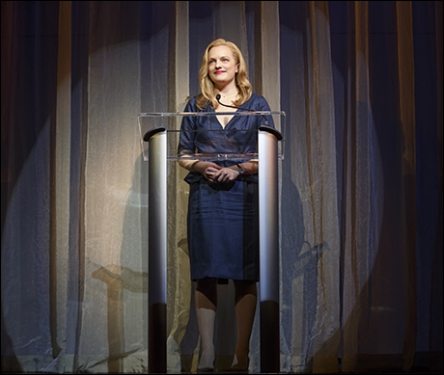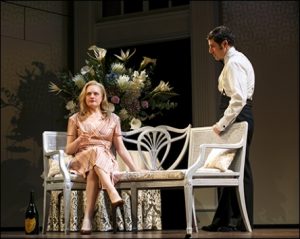

Whenever a show gets a Broadway revival, one has to wonder why exactly it is being revived. What does the show contribute to a new generation of theatergoers? What does it say about the time when it was made and how does that come into play in our times? One would think that a show would get revived only if there is obvious commercial appeal in putting together another production, or if the show in question is timeless, which brings us to the revival of The Heidi Chronicles, which doesn’t necessarily seem to fit into either category. The play by Wendy Wasserstein won the Pulitzer Prize and the Tony Award in 1989 for its bold commentary on what it thought the future of women would be like; sadly it plays out exactly like a 1980s time capsule unearthed in 2015.
The play covers three decades in the life of Heidi Holland (Elisabeth Moss), an art historian, who we first meet as she imparts a lecture on female painters, before we are transported back to the 1960s, where she is an idealistic student who thinks she will leave her mark on the world. We follow her as she embodies some of the archetypes of each decade: she’s an enraged protester in the 60s, a bold, outspoken professional in the 70s. Yet by the 80s she’s become an unhappy woman dissatisfied with the fact that she couldn’t “have it all”, as she was once promised.

The issue isn’t that she’s dissatisfied or that she’s questioning a system that undoubtedly lied to her, but that the play in question has failed to make her a real human being to begin with. All along she has been just a symbol, a vessel into which Wasserstein threw her once-biting commentary against oppression. Post the already problematic Sex and the City, The Heidi Chronicles seems positively retrograde, as it denies Heidi any kind of sexual empowerment and even seems to be advocating for a return to more traditional values in which a woman’s life is only measured by how much she pleases the men around her.
If the fact that the male characters in the play are much more interesting than Heidi has any kind of satirical undertone to it, it remains completely lost as Heidi’s conflicts seem petty when compared to the complex lives of the men in her life, her gay best friend Peter Patrone (a scene stealing Bryce Pinkham who should pretty much prepare his Tony acceptance speech now) and the caddish, yet charming Scoop Rosenbaum (Jason Biggs who is quite the revelation), both of whom Heidi failed to have romantic relationships with, but kept as close friends. But just because the times during which the play takes place were denying women the spaces they deserved, doesn’t mean the text shouldn’t have been altered to make Heidi more self aware without making her completely anachronistic.
While the play is called The Heidi Chronicles it often seems as if Heidi is only an observer who lashes out only to judge others based on a hierarchy of values she hasn’t lived up to. Perhaps it’s a strike of casting genius, or a strike of luck, that Heidi is being played by Moss, who has trodden similar territory in Mad Men, where she plays the ambitious Peggy Olsen, who started out as a secretary for a dickish ad agency creative, and slowly made her way up the corporate ladder. In Mad Men, we saw her character go from being a wallflower, to becoming one of the most complex, strongest characters on television. The difference between this and Heidi, is that Peggy was never denied her agency, and as such makes for a much more compelling human being to watch.

Moss brings some of Peggy’s qualities to Heidi, and even people unfamiliar with Mad Men, will undoubtedly realize that the actress onstage is doing so much more with the text than what she was given to work with. While the script expects Heidi to be composed of a series of reactions, Moss hints at the fact that there is more than meets the eye. Moss is an actress who we can always see deep in thought, which at times makes us wish she would go off-script and most likely improve on the show. It’s no surprise that the show is at its very best in the scenes in which Heidi addresses the audience; seeing her passionate take on female painters certainly makes for a richer experience than seeing her go through miniature dramatic arcs.
The show is directed by the great Pam MacKinnon who certainly displays a visual zest that will take audience members down memory lane, as she divides the chapters by using musical cues that were popular during the era. In a way it functions like a female version of Richard Linklater’s Boyhood in the sense that it comments on the importance of popular culture in establishing how we divide our memories. Handsomely produced and wonderfully acted, The Heidi Chronicles sadly can’t help but leave us with a bitter aftertaste, especially in the last scene that plays out like a “postmodernist” take on a Norman Rockwell painting. If it wanted to remind us about the struggles of women during the twentieth century, it might as well have added a dash of hope in the end, or at least sent us away thinking that change isn’t only possible, but worth fighting for.